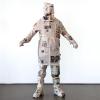Search Results
Showing results 21 to 36 of 36
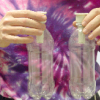
Does Air Weigh Anything?
Source Institutions
The demonstration/experiment provides quick proof that air has mass.
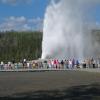
Tiny Geyser Models
Source Institutions
In this activity (located on page 2), learners will construct tiny model geysers out of film canisters, warm water, and antacid seltzer tablets.

Film Canister Rocket
Source Institutions
In this activity, learners construct and launch rockets using simple materials and their understanding of chemical reactions.

The Pressure's On
Source Institutions
In this chemistry activity, learners explore chemical reactions and their effects, including the kind of reaction in the human body that makes people burp!
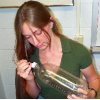
If Hot Air Rises, Why is it Cold in the Mountains?
Source Institutions
This demonstration/activity helps learners understand why higher elevations are not always warm simply because "hot air rises." Learners use a tire pump to increase the pressure and temperature inside

Bernoulli and More Bernoulli
Source Institutions
This lesson guide includes six simple and quick activities to help learners better understand Bernoulli's Principle.
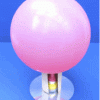
CD Air Puck
Source Institutions
In this activity, learners will use a compact disc to build an air puck that can glide across a smooth tabletop. The puck glides with almost no friction on a cushion of air escaping from a balloon.
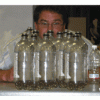
A Mole of Gas
Source Institutions
In this two-part activity, learners use everyday materials to visualize one mole of gas or 22.4 liters of gas. The first activity involves sublimating dry ice in large garbage bag.

Balloon Car
Source Institutions
In this physics activity, challenge learners to make and race a balloon-powered car. Learners construct the body out of a paper cup, wheels out of wooden spools. and fuel tank out of a balloon.

Tumble Wing Walkalong Glider
Source Institutions
In this physics activity (page 2 of the PDF), learners will construct their own walkalong glider. They will explore how air, though invisible, surrounds and affects other objects.
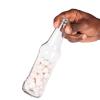
No Pressure
Source Institutions
In this activity, learners observe what would happen to their bodies if they went to outer space without a space suit.
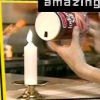
Amazing Air
Source Institutions
In this activity, learners construct a small "air cannon," and use its airflow to put out a candle (lit with the help of an adult).

Make Your Own Weather Station
Source Institutions
This three-part activity shows learners how to build three meteorology tools: a wind vane, a rain gauge, and a barometer.

Engineer an Aeolipile
Source Institutions
In this engineering design challenge, learners build an air-powered spinning machine.
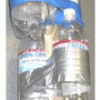
Portable Potable Pressure
Source Institutions
In this activity, learners use plastic water bottles, wood, and water to build an inexpensive and portable tool to demonstrate one atmosphere of pressure at sea level.

